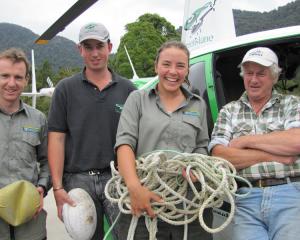Hearing of an appeal against Meridian's Project Hayes development resumed at Queenstown yesterday.
The hearing was adjourned last August when Judge Jon Jackson granted an application for further evidence to be heard, including that in relation to possible cumulative effects of both developments, situated within and close to Central Otago.
In his opening submission for Meridian, Wellington lawyer Hugh Rennie QC, said any combined effects of the wind farms, which would be 20km from one another if constructed, would be acceptable.
He said both wind farms would not be viewable from most vantage points, and during construction different roads would be used to transport material back and forth from sites.
Citing Meridian's landscape expert Peter Rough, Mr Rennie said any cumulative effects of both wind farms would range from "negligible to moderate, but overall slight" .
It was a view shared by a landscape witness in the Mahinerangi hearing, Frank Boffa, who said cumulative effects would be relatively minor given the distances between both farms, Mr Rennie said.
He said an Environment Court appeal hearing for Mahinerangi took into account possible cumulative effects of both developments, and it was decided both would not impact the environment much more than one.
"The judge in that case stated either wind farm would bring a significant change to the scene, but that together the change would not be much more significant," Mr Rennie said.
He said Meridian lodged and notified its plans for Project Hayes before Mahinerangi, and the Project Hayes initial consent hearing commenced prior to one for Mahinerangi.
He said on that basis, Project Hayes should have priority if cumulative effects were to be considered.
"If there were any reason to think the receiving environment was unable to absorb two wind farms (a proposition which is emphatically rejected), it would be for Mahinerangi to bear any restraint arising from cumulative effects of the two wind farms," Mr Rennie said.
When addressing the contrasting views of landscape architect Anne Steven, who has previously given evidence for appellant party Maniototo Environmental Society, Mr Rennie said she exaggerated negative elements of Project Hayes, and her opinion should be rejected.
"Given her trenchant opposition to the project, it is unsurprising that Ms Steven has sought out as many ways as she could to describe and amplify concerns about the cumulative effects of the project," he said.
In his conclusion, Mr Rennie consolidated Meridian's previous arguments for Project Hayes, including the need for additional electricity generation in New Zealand, and the Lammermoor Range site's abundant wind resource.
"Wind energy located in the project area is of national significance and international standing in respect of quality.
"In its own way it is as golden as the resources which previous miners and farmers sought to find in earlier times," he said.
Day 18
Panel: Environment Court Judge Jon Jackson, commissioner Alex Sutherland, commissioner Heather McConachy, and deputy commissioner Ken Fletcher.
Project: In October 2007 Meridian Energy was granted resource consent by the Central Otago District Council and Otago Regional Council to construct, use, and maintain a 176-turbine wind farm on the Lammermoor Range, in Central Otago.
The $2 billion Project Hayes is the largest proposed wind-farm development in the southern hemisphere, encompassing 92sq km of land.
Players: Appellants are the Upland Landscape Protection Society, John, Sue, and Andrew Douglas, the Maniototo Environmental Society, Eric and Cate Laurenson and the Eric and Cate Laurenson Family Trust, Ian and Sarah Manson and the Riverview Settlement Trust, Gaelle dit-Piquard, Ewan Carr, and Roch Sullivan.
Other Parties are the Central Otago District Council and Meridian Energy. The New Zealand Historic Places Trust, Contact Energy, and Brian Miller withdrew appeals.
Ewan Carr withdrew Brookside Properties and Danseys Pass Coach Inn from his own appeal. He continues to represent himself as well as the Upland Landscape Protection Society.
Yesterday's witness: Former chief executive officer of the New Zealand Institute of Economic Research Dr Brent Layton, of Wellington.
Today: Meridian will continue to call witnesses over the next two weeks of hearings, including Peter Rough, Tony Penny, Roger Sutton, Graham White, Prof Goran Strbac, and Tony Coggan.
Quote of the day: "Wind energy located in the project area is of national significance and international standing in respect of quality. In its own way it is as golden as the resources which previous miners and farmers sought to find in earlier times"- Meridian Energy lawyer Hugh Rennie QC, of Wellington.




